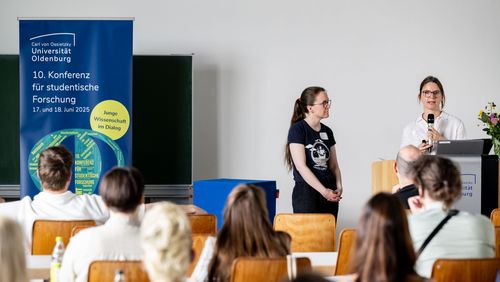The Founding Dean of the European Medical School Oldenburg-Groningen, Prof. Dr. Eckhart Hahn, in an interview about the sense of community among those involved in the project, the setting up of University Hospital Units and the selection of students – who have considerably more time for learning at Oldenburg.
The Model Curriculum in Medicine has been developed, the first students are due to arrive on October 1, and 22 days later the official inauguration of the European Medical School Oldenburg-Groningen will take place. What else is on the agenda?
Hahn: We still have plenty to do. One of my top priorities is to achieve an even greater sense of community among all those involved in the new Faculty of Medicine and Health Sciences.
How can a sense of community be achieved among such a large number of participants from university and clinical medicine?
Hahn: I think we're on the right track – this was quite evident at our Faculty weekend gathering. Having everyone sit down at a table in an informal atmosphere to chat and exchange views and experiences – nothing can replace this dialogue. And including students has proved to be extremely constructive and important.
The project foresees the setting up of a variety of university hospital areas. What will this look like in practice?
Hahn: First you need to know that here in Germany there are two different models for university hospitals: the cooperation model and the integration model. With the integration model, the faculty management and clinical management are integrated and coordinated by a joint management committee, as in Hannover and Göttingen. With the cooperation model, on the other hand, the aim is for the school and university hospital units to cooperate each with their own managements which however consult with each other in their academic capacity under appropriate agreements.
So Oldenburg is adopting the cooperation model?
Hahn: It will be a special form of the cooperation model a new form that has never been put into practice anywhere else. On the one hand we have a university with the faculty of medicine and health sciences and on the other the hospital university units within various hospitals with their respective administrative bodies. This model was invented in Bochum around 35 years ago. Inevitably, mistakes were made that still have repercussions today. But here in Oldenburg we can learn from these experiences and optimise the model.
In what way will it be optimised?
Hahn: The University and the government of the state of Lower Saxony will sign bilateral agreements with each of the partner hospitals and their administrative body in order to regulate the distribution of responsibilities, as well as teaching and research. These agreements will be subject to an additional joint agreement that merges all the concerned parties into a single medical university institution. Believe me, the creation of such an umbrella structure is a fascinating process. All the parties concerned are making an incredible effort. I am convinced that there will be no model that is as efficient as the Oldenburg adaptation of the cooperation model.
What are the obstacles with the European cross-border approach?
Hahn: I have been following the Bologna Process for years and one thing I've noticed is that the international component and the language barriers are often ignored. Bringing 27 countries with 27 different languages together in a common medical forum – that's no mean feat. Particularly as the patients also speak different languages. There is therefore a revolutionary aspect to our German-Dutch – or in other words European – project. Another aspect is that in Groningen they have the Bachelor/Master cycle, and in Oldenburg we follow the German licensure law (Approbationsordnung für Ärzte) with a final state examination. Given equal content, this is a real challenge for curriculum design, but we´ll “Master” this.
The students are selected not only on the basis of their final school exam grades (Abiturnote) but also other criteria ...
Hahn: That's correct. Final School exam grades can be a good indication of a student's studying and exam skills, but so far there's no scientific evidence as to precisely what the grades mean in terms of professional performance and career success. And that's what counts: working as a doctor requires a good long-term and short-term memory – as well as the ability to communicate with people. These aspects are factored into our selection process. And by the way, the results of our 30-year longitudinal study of the curriculum and its alumni will show how relevant school grades really are.
So how does the University select its students?
Hahn: Of the 40 places available on the course, 19 students are selected by the Foundation for Higher Education Admission (Stiftung für Hochschulzulassung), 21 places are allocated according to the University's own criteria. This is done from a list sent by the Stiftung für Hochschulzulassung with 63 slots. To be on this list, candidates who have learned a profession related to medicine receive a 0.5 point bonus on their final school grade . In addition, students can take an exam specifically for medical courses, the so-called TMS test, which – depending on the results – can improve the final school exam grade. From these 63 candidates 21 are then selected by the university. The selection is made as follows: in compliance with the state regulations the final school exam grades (without bonus) count for 51 percent, while communication skills and other personal characteristics will be assessed by structured interviews and make up the remaining 49 percent.
And what determines the selection of the 19 students chosen by the Foundation?
Hahn: The final school exam grade is the only selection criterion for 7 places, 7 places are allocated based on the waiting time of applicants and 5 slots are given to fixed quotas like foreigners (2), defined special hardship criteria (1), and special admission criteria (2).
How is the course structured?
Hahn: Each year is divided into four ten-week modules for 6 years. This means our students have an academic year of forty weeks – considerably more than with traditional degree courses. During years 1 to 3 each week is structured in a similar pattern, with lectures and seminars held on five days of the week. Wednesday is the first day of the teaching week, so the weekend is "right in the middle" as it were. This gives students time to process what they have learned.
With which courses do the students begin their medical training?
Hahn: The first module deals with the locomotor system. Each week of a module focuses on a specific medical problem. The first day begins with a lecture in which a patient also takes part and discusses his illness. This direct contact is an important aspect for us: the students learn right from the start that they are dealing with people who are suffering.
And what else forms part of a module week?
Hahn: The students attend further lectures and seminars on the topic. They also work independently on certain aspects of the week's topic in groups. There are also courses in physiology, biochemistry, histology, clinical chemistry – all the subjects that are in the approbation regulations (Approbationsordnung) for medical doctors. And the students also carry out small research projects in groups. At the end of the six-year course of study the students have 20 weeks to write a research paper. In this way a "longitudinal research curriculum" runs all the way through the degree course – one which is more intensive than elsewhere, simply because the longer academic years mean we have more time for research oriented teaching.
Won't the high number of weeks per year put the students under too much pressure?
Hahn: On the contrary, and in the Netherlands and other European countries a considerably longer academic year is the norm. Students are under less pressure and still have more time to learn and more opportunities for personal development. According to EU directives, a medical student must complete 5500 hours of theoretical and practical instruction. If in six years they only have 24 weeks a year in which to do this – as is the case with traditional courses of study in Germany – they really are overburdened.



